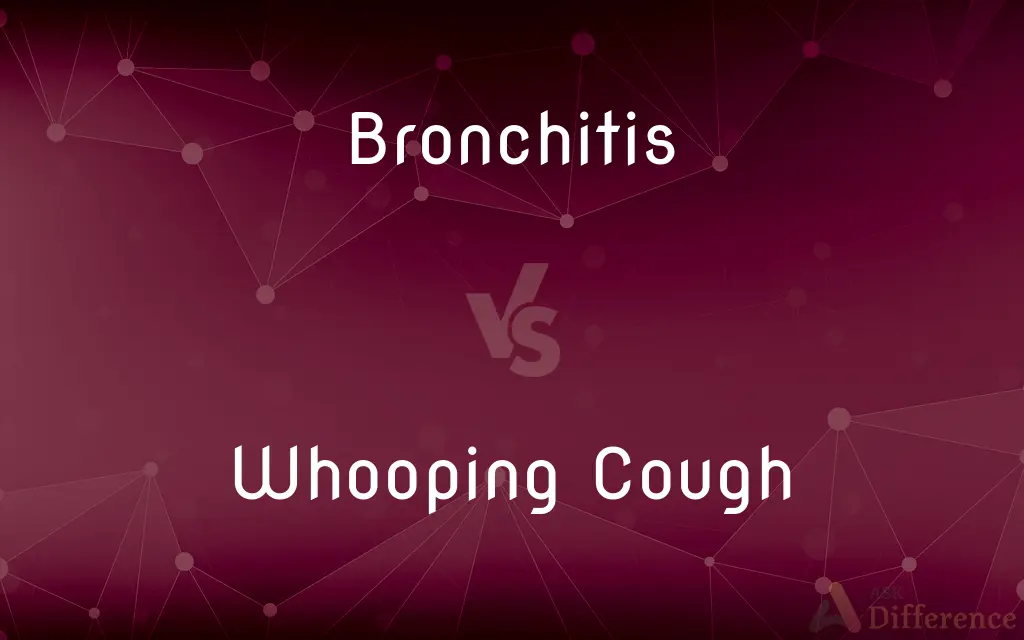Bronchitis vs. Whooping Cough — What's the Difference?
Edited by Tayyaba Rehman — By Fiza Rafique — Published on November 21, 2023
Bronchitis refers to inflammation of bronchial tubes. Whooping Cough is a bacterial infection with severe coughing spells.

Difference Between Bronchitis and Whooping Cough
Table of Contents
ADVERTISEMENT
Key Differences
Bronchitis refers to the inflammation of the mucous membranes of the bronchi, possibly resulting from a virus or other irritants. Whooping Cough, on the contrary, is an infection caused by the bacterium Bordetella pertussis, leading to severe coughing fits followed by a high-pitched "whoop" sound.
While Bronchitis is generally recognized by symptoms such as a persistent cough, mucus production, and fatigue, Whooping Cough is notorious for the "whooping" noise that follows a coughing spell, as well as vomiting after coughing and exhaustion.
Treatment for Bronchitis often involves rest, pain relievers, and sometimes bronchodilators to ease breathing; antibiotics aren't typically used unless there's a bacterial infection. In contrast, Whooping Cough is treated with antibiotics, and prevention includes vaccination.
Bronchitis can be acute or chronic, with smoking being a major cause of the latter. Whooping Cough, however, primarily affects infants and young children, though it can also impact adults, especially those with weakened immune systems.
Bronchitis symptoms usually resolve in two to three weeks, but the cough can linger. Whooping Cough, however, can last for many weeks or even months, known as the "100-day cough."
ADVERTISEMENT
Comparison Chart
Spelling
B, R, and O present
W, H, and O present
Syllables
Three
Three
Letters
10
13
Consonant to Vowel Ratio
7:3
9:4
Word Origin
Greek origin
Onomatopoeic origin
Compare with Definitions
Bronchitis
A condition that can lead to decreased oxygen flow.
Severe bronchitis can significantly impact breathing.
Whooping Cough
Known for a severe hacking cough followed by a high-pitched intake of breath.
The baby's whooping cough made nights difficult.
Bronchitis
Inflammation of the bronchial tubes.
Heavy smokers are prone to chronic bronchitis.
Whooping Cough
A highly contagious respiratory tract infection.
Unvaccinated children are at higher risk for whooping cough.
Bronchitis
Can be either acute or chronic in occurrence.
His persistent cough was diagnosed as acute bronchitis.
Whooping Cough
Preventable by vaccine.
The DTaP vaccine protects children from diseases, including whooping cough.
Bronchitis
Often a complication following a respiratory infection.
After the flu, she developed bronchitis.
Whooping Cough
Caused by the bacterium Bordetella pertussis.
Antibiotics are effective against whooping cough if administered early.
Bronchitis
A respiratory condition marked by coughing and mucus.
During cold seasons, cases of bronchitis increase.
Whooping Cough
Can be life-threatening for infants and toddlers.
Due to serious complications, whooping cough in infants requires immediate medical attention.
Bronchitis
Chronic or acute inflammation of the mucous membrane of the bronchial tubes.
Whooping Cough
Alternative spelling of whooping cough
Bronchitis
(uncountable) An inflammation of the bronchi of the lungs, that causes the cilia of the bronchial epithelial cells to stop functioning.
Bronchitis
(countable) An occurrence of, a case (patient) of, or a type of bronchitis.
Bronchitis
Inflammation, acute or chronic, of the bronchial tubes or any part of them.
Bronchitis
Inflammation of the membranes lining the bronchial tubes
Common Curiosities
What is bronchitis?
Bronchitis is an inflammation of the lining of your bronchial tubes, which carry air to and from your lungs.
How is whooping cough transmitted?
Whooping cough spreads through respiratory droplets when an infected person coughs or sneezes.
What causes whooping cough?
Whooping cough is caused by infection with the Bordetella pertussis bacterium.
Can bronchitis be cured?
Acute bronchitis often resolves on its own, but chronic bronchitis is a long-term condition that requires medical management.
Are there different types of bronchitis?
Yes, bronchitis can be categorized as either acute or chronic.
What complications are associated with bronchitis?
Chronic bronchitis can lead to complications like pneumonia and COPD.
Can adults get whooping cough?
Yes, adults can get whooping cough, especially if they are not up to date with their vaccinations or their immunity has waned.
What are the symptoms of whooping cough?
Symptoms include severe coughing fits, a "whooping" sound after coughing, and possible vomiting.
Is there a vaccine for whooping cough?
Yes, the DTaP vaccine for children and the Tdap booster for adults prevent whooping cough.
Is bronchitis infectious?
Acute bronchitis can be infectious if it's caused by an infection, while chronic bronchitis related to lifestyle factors is not.
Do smokers get bronchitis more often?
Yes, smokers are at a higher risk of developing chronic bronchitis and other respiratory conditions.
How can bronchitis be prevented?
Avoiding smoking, wearing masks around irritants, and practicing good hygiene can help prevent bronchitis.
How long does whooping cough last?
The severe coughing stage of whooping cough usually lasts two to ten weeks or more.
Who is most at risk for whooping cough?
Infants and young children, especially those not fully vaccinated, are most at risk.
Can bronchitis develop into pneumonia?
Yes, in some cases, bronchitis can lead to pneumonia, especially in high-risk individuals.
Share Your Discovery

Previous Comparison
Selendang vs. Tudung
Next Comparison
Varchar vs. Varchar2Author Spotlight
Written by
Fiza RafiqueFiza Rafique is a skilled content writer at AskDifference.com, where she meticulously refines and enhances written pieces. Drawing from her vast editorial expertise, Fiza ensures clarity, accuracy, and precision in every article. Passionate about language, she continually seeks to elevate the quality of content for readers worldwide.
Edited by
Tayyaba RehmanTayyaba Rehman is a distinguished writer, currently serving as a primary contributor to askdifference.com. As a researcher in semantics and etymology, Tayyaba's passion for the complexity of languages and their distinctions has found a perfect home on the platform. Tayyaba delves into the intricacies of language, distinguishing between commonly confused words and phrases, thereby providing clarity for readers worldwide.













































